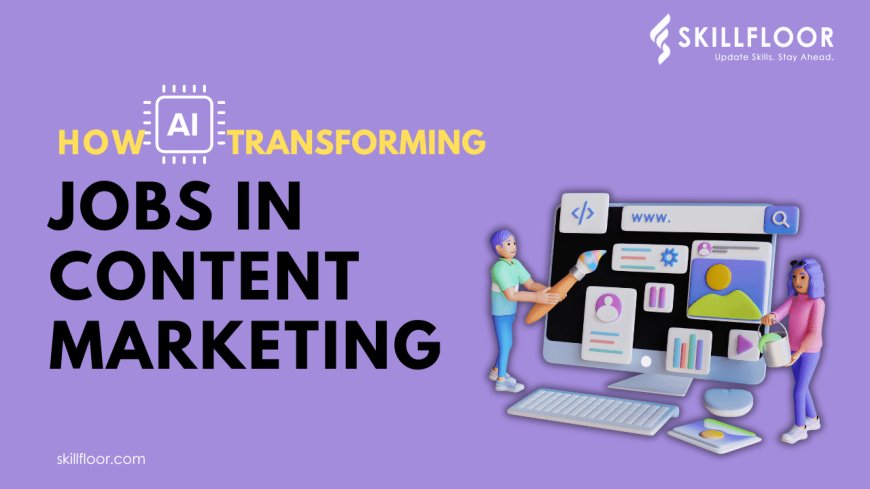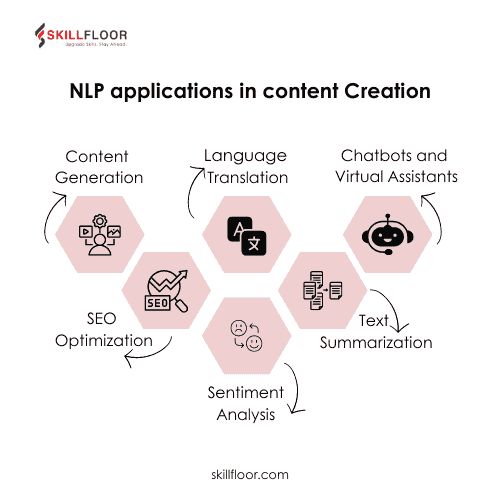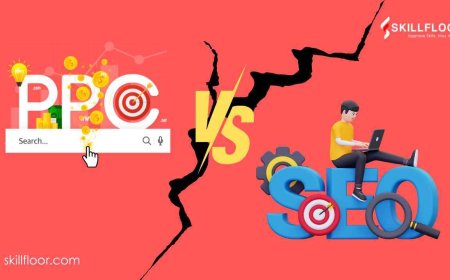AI Roles In Content Marketing Jobs
Explore the impact of AI on content marketing jobs, uncovering new roles and opportunities for professionals in the digital environment.

Artificial intelligence (AI) has shaken up the world of content marketing, hasn't it? It's like having a super-smart assistant who can analyze tons of data to help us tailor our content just right for different groups of people. With AI in the mix, our targeting is spot-on, which means our campaigns perform better and people engage more. And you know what's cool? AI doesn't just stop there. It makes our lives easier by giving us insights into what our audience likes, making content creation a breeze. Plus, it takes care of all those repetitive tasks, freeing up our time to focus on the stuff that matters. If you're thinking about diving into digital marketing, understanding how AI works is key. It's like having a secret weapon that prepares you for the ever-evolving world of marketing. And in today's digital landscape, integrating AI into our strategies isn't just important, it's essential. It's all about learning and optimizing, making sure our content reaches the right people at the right time. So yeah, those AI roles in content marketing? They're a game-changer. They represent a shift towards smarter, more data-driven marketing strategies that are vital in this digital age.
The Evolution of AI in Content Marketing
Its introduction to basic data analysis and artificial intelligence (AI) has played an important part in content marketing. At first, it helped marketers comprehend consumer preferences and trends. Natural language processing and other AI technologies eventually made it possible to create content automatically that was targeted at particular audiences. By analyzing user interactions, machine learning is currently expanding the potential of AI by enhancing content personalization. These days, AI aids with sentiment analysis as well, enabling companies to instantly understand and respond to customer comments. From straightforward analytical tasks to sophisticated, real-time decision-making that improves digital marketing tactics, the evolution of AI in content marketing demonstrates its expanding effect.
AI-Powered Content Creation
Artificial Intelligence (AI) is used by automated content generation tools and platforms to speed up content development for authors and marketers. These programs automate the production of articles, social media postings, and more by utilizing technologies like machine learning and natural language processing (NLP). They examine the available data to create material that is useful, logical, and compliant with predetermined standards. Additionally, some platforms have SEO optimization built in to improve online content visibility. Through the automation of repetitive content creation processes, these solutions enhance efficiency and productivity in digital content workflows by freeing up creators to concentrate on strategy and innovation.
Natural Language Processing (NLP) has several applications in content creation:

Content Generation: By modeling human writing styles, natural language processing (NLP) technologies may automatically produce written material, including reports and articles.
SEO Optimization: By locating appropriate phrases and making sure they are used correctly within the text, NLP assists in making content more search engine-friendly.
Language Translation: NLP makes it possible to translate content into several languages, which expands the audience for that content.
Sentiment Analysis: Sentiment analysis is an NLP tool that examines textual emotions to help content producers better understand how their target audience responds to certain subjects.
Text Summarization: Natural Language Processing (NLP) is capable of condensing lengthy text passages into manageable chunks that are faster and easier to read.
Chatbots and Virtual Assistants: Natural language processing (NLP) is utilized in the development of chatbots and virtual assistants that can produce responses in real time that resemble those of a human.
AI-Driven Content Optimization
Data analysis and predictive analytics play essential roles in using artificial intelligence (AI) for content performance, personalization, and targeting strategies.
-
Audience Segmentation: AI uses user data to segment audiences according to their demographics, interests, and behaviors. This allows for the distribution of content that is specifically tailored to each audience.
-
Predictive analytics: By analyzing past data, AI forecasts future user behaviors and trends, assisting marketers in creating content that will appeal to their target audience's demands in the future.
-
Content Personalization: AI makes sure that every piece of content is interesting and relevant to the person receiving it by using data insights to personalize it for each user.
-
Performance Optimization: To continuously improve and optimize content strategies for improved performance, AI systems examine feedback and engagement metrics.
-
Real-Time Modifications: AI enables agile marketing responses by enabling real-time modifications to a content strategy based on continuous user interaction data.
-
Enhanced User Experience: AI helps with the creation of a more personalized and fulfilling user experience, boosting engagement and loyalty, by comprehending user preferences and behaviors.
SEO and Keyword Optimization Tools Empowered by AI in Content
SEO and keyword optimization tools empowered by AI help enhance the visibility and effectiveness of digital content. Here’s how these tools work:
-
Keyword Discovery: AI tools analyze search trends and user behavior to identify high-value keywords that are relevant to your target audience.
-
Content Optimization: These tools suggest where to place keywords within content for optimal search engine rankings, including titles, headers, and body text.
-
SEO Performance Tracking: AI-powered tools monitor the performance of content in search engine results, providing insights on how to improve rankings over time.
-
Competitive Analysis: AI helps analyze competitors' content and SEO strategies, offering insights and recommendations to stay ahead in search rankings.
-
Link Building: AI can identify potential opportunities for link building by analyzing the link profiles of similar content across the web.
AI-Assisted Content Distribution
By using AI algorithms and content recommendation systems to analyze user data and personalize content distribution, digital and social media marketing can be greatly improved. By making content recommendations based on user behavior and preferences, these systems increase user engagement. At the same time, automation in social media management makes it easier to distribute material across platforms effectively, guaranteeing optimal reach and timely publishing. By evaluating performance data, AI tools also aid in strategy improvement, improving process efficiency. When combined, these AI-powered tools simplify content strategies, enabling marketers to more precisely target their audience and increase engagement.
Future Trends and Opportunities
The future of artificial intelligence (AI) in content marketing is being increasingly shaped by emerging technologies, which are providing new tools and techniques that improve the creation, optimization, and distribution of content. These developments broaden the range of what can be automated and customized while also increasing the efficacy of content marketing tactics. Thus, there is a bright future ahead for experts with AI expertise in content marketing. The need for people who can use AI tools to analyze data, create content, and improve marketing strategies is rising. This trend implies that content marketers who want to maintain their competitiveness in a rapidly changing digital marketplace will need to be proficient in AI technologies.
The way content is produced, targeted, and distributed has been completely transformed by AI's revolutionary role in content marketing, making tactics more effective and data-driven. Professionals in the field need to adjust by learning AI skills to properly use these new technologies as AI continues to be integrated into content marketing roles. To stay up with the changing scene, integration requires a proactive strategy to incorporate AI technologies and ongoing learning. For those working in the field of digital marketing, retaining a competitive edge in the market and growing professionally will depend on keeping up with AI developments and expanding one's skill set.




























































